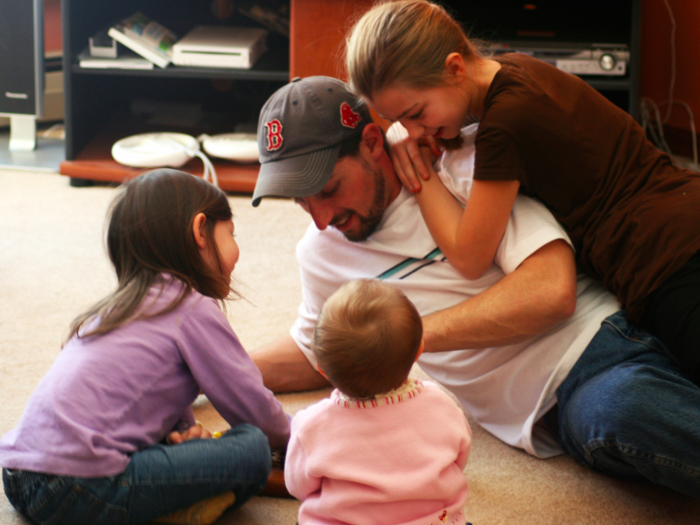
"In all the work I have done within the field of happiness research. This is the point I am surest about: the best predictor of whether we are happy or not is our social relationships," said Wiking in his book.
Wiking cites the journalist Cathy Strongman who moved from London to Copenhagen, and wrote in the Guardian: "Work later than 5.30 and the office is a morgue. Work at the weekend and the Danes think you are mad. The idea is that families have time to play and eat together at the end of the day, every day."

"Sweets are hygglige. Cake is hyggeligt. Coffee or hot chocolate are hyggeligt, too. Carrot sticks, not so much," says Wiking.
He believes that the high level of meat, confectionary and coffee consumption in Denmark is directly linked to hygge.
"Hygge is about being kind to yourself — giving yourself a treat, and giving yourself, and each other, a break from the demands of healthy living," he says.
Wiking's compatriots seem to agree: the average Dane eats three kilos of bacon a year.

The home is "hygge headquarters," Wiking says. They even have a word for it: hjemmehygge (home hygge). This may explain the Danish obsession with good design.
They also have the most living space per capita in Europe.

Christmas, Wiking says, is the most hyggelig part of the year. "Even though it is possible to hygge all year round, only once a year is hygge the ultimate goal of an entire month," he says.
Christmas traditions in Denmark are not wildly different to those in the UK or the US, but the difference is that "a Danish Christmas will always be planned, thought of, and evaluated in relation to the concept of hygge."
There is even a word for it — julehygge (Christmas-hygge).

From its iconic lampshades to the staggeringly widespread use of candles, Denmark is a country obsessed with lighting. The Happiness Research Institute's studies shows that 85% of people associatehyggewith candles. 28% of Danes light candles every day.
Wiking quotes the American ambassador to Denmark, who says that candles create "a kind of emotional happiness, an emotional cosiness."

Appropriately enough, the happiest country in the world has the happiest capital city in the world. And it is full ofhyggleligdestinations — from restaurants selling pickled herring in the New Harbour to the iconic Tivoli gardens, which is transformed every Christmas into a spectacular festival of light.

While hygge clearly plays a major part in Denmark's happiness, Wiking is keen to emphasise that it is the welfare model which fundamentally underpins the nation's wellbeing — they have high taxes, but receive social security, universal healthcare, and a universal pension in return.
Wiking says that there is "wide support for the welfare state."
"The support stems from an awareness of the fact that the welfare model turns our collective wealth into well-being," he says.
Critics often point out that anti-depressant consumption is very high in Denmark for a country that claims to be the happiest in the world. According to the OECD, Denmark ranks second in Europe for anti-depressant consumption per capita.
Wiking told Business Insider in an interview, however, that this supposed “paradox” is nothing of the sort.
“The real story is, these countries recognise mental illness and try to treat it in some way,” Wiking told Business Insider. “Being a society that acknowledges that people suffer from mental illnesses, and that we should try and do something about them? I think that's a good thing. A lot of people miss that - they just think it's a paradox."
 I spent $2,000 for 7 nights in a 179-square-foot room on one of the world's largest cruise ships. Take a look inside my cabin.
I spent $2,000 for 7 nights in a 179-square-foot room on one of the world's largest cruise ships. Take a look inside my cabin. Colon cancer rates are rising in young people. If you have two symptoms you should get a colonoscopy, a GI oncologist says.
Colon cancer rates are rising in young people. If you have two symptoms you should get a colonoscopy, a GI oncologist says. Saudi Arabia wants China to help fund its struggling $500 billion Neom megaproject. Investors may not be too excited.
Saudi Arabia wants China to help fund its struggling $500 billion Neom megaproject. Investors may not be too excited. Catan adds climate change to the latest edition of the world-famous board game
Catan adds climate change to the latest edition of the world-famous board game
 Tired of blatant misinformation in the media? This video game can help you and your family fight fake news!
Tired of blatant misinformation in the media? This video game can help you and your family fight fake news!
 Tired of blatant misinformation in the media? This video game can help you and your family fight fake news!
Tired of blatant misinformation in the media? This video game can help you and your family fight fake news!

Copyright © 2024. Times Internet Limited. All rights reserved.For reprint rights. Times Syndication Service.